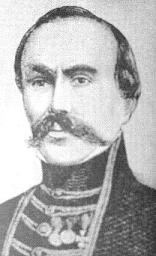
Friedrich August Rudolph Kolenati
Encyclopedia

Czechoslovakia
Czechoslovakia or Czecho-Slovakia was a sovereign state in Central Europe which existed from October 1918, when it declared its independence from the Austro-Hungarian Empire, until 1992...
-German botanist and zoologist active primarily in Prague
Prague
Prague is the capital and largest city of the Czech Republic. Situated in the north-west of the country on the Vltava river, the city is home to about 1.3 million people, while its metropolitan area is estimated to have a population of over 2.3 million...
and Brno
Brno
Brno by population and area is the second largest city in the Czech Republic, the largest Moravian city, and the historical capital city of the Margraviate of Moravia. Brno is the administrative centre of the South Moravian Region where it forms a separate district Brno-City District...
.
Kolenati was born in Prague
Prague
Prague is the capital and largest city of the Czech Republic. Situated in the north-west of the country on the Vltava river, the city is home to about 1.3 million people, while its metropolitan area is estimated to have a population of over 2.3 million...
where he completed elementary school and high school, then after graduation from the Medical Faculty of Charles University as a student of the natural sciences, especially botany
Botany
Botany, plant science, or plant biology is a branch of biology that involves the scientific study of plant life. Traditionally, botany also included the study of fungi, algae and viruses...
and entomology
Entomology
Entomology is the scientific study of insects, a branch of arthropodology...
, he continued as an assistant in botany. In 1842 he moved to Russia
Russia
Russia or , officially known as both Russia and the Russian Federation , is a country in northern Eurasia. It is a federal semi-presidential republic, comprising 83 federal subjects...
as an assistant in zoology
Zoology
Zoology |zoölogy]]), is the branch of biology that relates to the animal kingdom, including the structure, embryology, evolution, classification, habits, and distribution of all animals, both living and extinct...
at the St Petersburg Academy of Sciences. From 1842-1845 he participated in explorations of the Caucasus
Caucasus
The Caucasus, also Caucas or Caucasia , is a geopolitical region at the border of Europe and Asia, and situated between the Black and the Caspian sea...
, ranging from the Azov Sea to Nagorno-Karabakh
Nagorno-Karabakh
Nagorno-Karabakh is a landlocked region in the South Caucasus, lying between Lower Karabakh and Zangezur and covering the southeastern range of the Lesser Caucasus mountains...
, and later conducted a survey of the lower Don River
Don River (Russia)
The Don River is one of the major rivers of Russia. It rises in the town of Novomoskovsk 60 kilometres southeast from Tula, southeast of Moscow, and flows for a distance of about 1,950 kilometres to the Sea of Azov....
.
In 1845 Kolenati returned to Prague, where he was named an Associate Professor of Natural History. In 1848 he played an active part in the revolutionary events of the time, for which he was subsequently arrested. After his release from prison, he gave lectures in mineralogy
Mineralogy
Mineralogy is the study of chemistry, crystal structure, and physical properties of minerals. Specific studies within mineralogy include the processes of mineral origin and formation, classification of minerals, their geographical distribution, as well as their utilization.-History:Early writing...
and zoology
Zoology
Zoology |zoölogy]]), is the branch of biology that relates to the animal kingdom, including the structure, embryology, evolution, classification, habits, and distribution of all animals, both living and extinct...
at the Prague Polytechnic Institute and worked as a professor of natural history at the Lesser gymnasium. In 1848 he co-founded the Lotos Science Association, and was appointed full professor of natural science and technology at the Polytechnic Institute at Brno
Brno
Brno by population and area is the second largest city in the Czech Republic, the largest Moravian city, and the historical capital city of the Margraviate of Moravia. Brno is the administrative centre of the South Moravian Region where it forms a separate district Brno-City District...
. In this department during his tenure significantly expanded its natural history collections, especially its mineralogical collections. He died while on a research trip to Praděd
Praded
Praděd is the highest mountain of Hrubý Jeseník mountains and Moravia and Czech Silesia and is fifth highest mountain of Czech Republic.The average annual temperature is about 1°C....
and is buried in Little Morávka.
Kolenati was a member of the Royal Czech Society of Sciences
Royal Czech Society of Sciences
The Royal Czech Society of Sciences was established in 1784 to be the scientific center for Czech Crown lands. It was succeeded by the Czechoslovak Academy of Sciences in 1952, and finally became what is known today as the Academy of Sciences of the Czech Republic in 1992.-History:The Society was...
, published more than 50 entomological works, and was also considered an expert on bat
Bat
Bats are mammals of the order Chiroptera "hand" and pteron "wing") whose forelimbs form webbed wings, making them the only mammals naturally capable of true and sustained flight. By contrast, other mammals said to fly, such as flying squirrels, gliding possums, and colugos, glide rather than fly,...
s. His collection of beetle
Beetle
Coleoptera is an order of insects commonly called beetles. The word "coleoptera" is from the Greek , koleos, "sheath"; and , pteron, "wing", thus "sheathed wing". Coleoptera contains more species than any other order, constituting almost 25% of all known life-forms...
s from the first half of the 19th century has become one of the foundations of the National Museum
National Museum (Prague)
The National museum is a Czech museum institution intended to systematically establish, prepare and publicly exhibit natural scientific and historical collections. It was founded 1818 in Prague by Kašpar Maria Šternberg...
's entomological collection in Prague.

